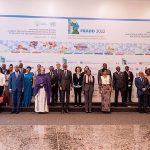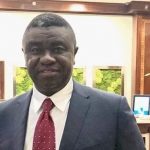[OPINION] Pantami Is My Friend, But He Can’t Be Defended
African News, Articles/Opinion, Featured, Latest Headlines Saturday, April 17th, 2021
By Farooq A. Kperogi, @farooqkperogi
(AFRICAN EXAMINER) – This is a difficult column to write because although scores of people have importuned me to intervene in the controversy regarding Communication and Digital Economy Minister Isa Ali Ibrahim Pantami’s utterances before he came into government, my wife, who knows Pantami is my friend, pleaded with me to stay out of it.
But I would be a hypocrite and betray the meaning of my name (and also my late father who taught me the meaning of my name when I was too young to fully grasp it and who never failed to remind me to live up to it) if I sidestep this consuming national controversy because it puts my friend in a bad light.
The truth is that it’s impossible to deploy the resources of logic, reason, basic decency, and even religious morality to defend some of the sermons Pantami gave in the early to late 2000s, especially in light of his current position as a federal minister in charge of a vast treasure trove of citizens’ sensitive information. I’ll come to this shortly.
But, first, how did the controversy about Pantami’s past preachments come to the forefront of national conversation? A story appeared in a few Nigerian news sites on April 12 alleging that Pantami was a Boko Haram sympathizer and enabler who is now on the radar of America’s intelligence community.
The most prominent of the newspapers that gave wing to this story was James Ibori’s Daily Independent, which alleged that Pantami had “ties with Abu Quata¬da al Falasimi and other Al-Qaeda leaders that he revered and spoke glowingly of in several of his videos on YouTube” on the basis of which he is now “on the watch list of the [sic] America’s Intelligence Service.”
The backstory to this story is that it was planted by executives of telecommunications companies in Nigeria whose companies are hemorrhaging financially because of Pantami’s December 9, 2020 directive that halted the sale, activation, and registration of new SIM cards until an “audit of the Subscriber Registration Database” is completed.
I know this because at least two editor friends confided in me that they had received the story of Pantami’s alleged links to terrorism and his surveillance by US intelligence authorities from people connected to Nigeria’s telecommunications industry, but that they declined to publish it because it was legally problematic.
I suspect that Pantami himself has identified the source of his troubles because, on April 15, he ordered a conditional resumption of new SIM card sale, activation and registration from April 19 “as long as mandatory National Identification Number (NIN) verification is done and the guidelines of the Revised National Digital Identity Policy for SIM Card Registration are fully adhered to.”
Nonetheless, in spite of efforts by paid and unpaid media and social media “influencers” to defend him—and the retraction of the story that alleged his sympathies for domestic and international terrorists—the truth is that his rhetorical entanglements with extremist Salafist ideologies, which I wasn’t familiar with until fairly recently, justify the critical scrutiny he is receiving now.
In a series of reports, complete with audiographic accompaniments, the Peoples Gazette has unearthed sermons by Pantami that amounted to unvarnished homiletic endorsements of terrorism and intolerance of non-Muslims.
For instance, in response to a question about Osama bin Laden’s “killing of innocent unbelievers,” Pantami said although he conceded that Bin Laden was liable to err because he was human, “I still consider him as a better Muslim than myself” and pointed out that “We are all happy whenever unbelievers are being killed, but the Sharia does not allow us to kill them without a reason.” You can’t defend that.
People’s Gazette also unearthed an audiotape in which he engaged in a weepy defense of Boko Haram terrorists against extra-judicial killings and asked for an amnesty for them just like Niger Delta militants. “See what our fellow Muslim brothers’ blood has turned to? Even pig blood has more value than that of a fellow Muslim brother,” he said.
In the aftermath of the religious crisis in Shendam in Plateau State in 2004 in which Christian militiamen murdered scores of Hausa Muslims, Pantami was livid and tearful. In an audio of his preaching, he said the “Ahlus Sunna,” that is, people who are now called Salafists, should strike back and shun politicians and religious clerics who preached peace and restraint.
“This jihad is an obligation for every single believer, especially in Nigeria (hādhā jihād farḍ ‘ayn ‘ala kull muslim wa-khuṣūṣan fī Nījīriyā),” he said.
In his March 2019 paper titled “The ‘Popular Discourses of Salafi Counter-Radicalism in Nigeria’ Revisited: A Response to Abdullahi Lamido’s Review of Alexander Thurston, Boko Haram,” Professor Andrea Brigaglia of the University of Cape Town, South Africa, writes:
“Subsequently, Pantami offers himself as a volunteer to mobilise the Hisba police of the Muslim-majority states and to be appointed as the ‘commander’ (Hausa: kwamanda) of a militia ready to travel to Yelwa Shendam to join the fight in defence of the Muslims. The speech, which is about twenty minutes long, concludes with the prayer: ‘Oh God, give victory to the Taliban and to al-Qaeda’ (Allahumma ’nṣur Ṭālibān wa-tanẓīm al-Qā‘ida).”
There are many more indefensible rhetorical endorsements of extremism that can be found in Pantami’s past preaching. In my opinion, it is legitimate for non-Muslims to be concerned that someone with that sort of baggage is a federal minister—just like it would be valid for Muslims to be outraged if a Christian minister has been shown to have espoused extremist views before they became minister.
Yemi Osinbajo, for instance, has been accused of being an intolerant, narrow-minded Christian extremist who wallows in his Redeemed Christian Church of God (RCCG) bubble, who employs only Yoruba people who belong to the RCCG, but while that is condemnable, no one has yet accused of him advocating views as extreme as Pantami’s when he was a pastor.
Nevertheless, while I denounce Pantami’s past embrace of extremism in his public preaching, I want to point out that there is a vast disjunction between his rhetoric and his person. People who know him outside the pulpit attest to his compassion, kindness, and peacefulness.
Although an April 15, 2009 U.S. diplomatic cable (exposed by WikiLeaks in 2011) about the religious crisis in Bauchi during that year said “Imam Fantami Isa, who preached at the mosque, had been previously thrown out of Abubakar Tafawa Balewa University and of a Gombe mosque for preaching inflammatory rhetoric,” he is not known to have instigated any religious upheavals since then.
I also think he has evolved from the days of his fiery homiletic entanglements with stochastic terrorism. I can point to a few evidentiary proofs. First, although he said in one audio that he wanted to push Nigeria to the point where there would be no iconography in our national currency and even political campaign posters, he now obviously loves photography.
Second, although previous sermons expressed contempt for working for the government and even derided Islamic clerics who do, this is Pantami’s second political appointment. Before he was appointed minister, he was DG of NITDA.
Third, he earned a doctorate from the UK’s Robert Gordon University in 2014 and is now so enamored of the West that he even claims on his Twitter page and elsewhere that he was “trained” at “Oxford; Harvard; Cambridge; MIT/IMD” although he only attended a few weeks’ courses there after being in government.
But the notion that these facts show evidence that he has changed is just my extrapolation. If he indeed has evolved like I think he has, he should address a world press conference and say so. At the very least, he should give the context for his previous incendiary preachments.
No one can do this for him. Paying media houses to “fact-check” un-fact-checkable claims (such as whether he is on a watchlist) and to cleverly twist facts to deceive a gullible reading public— and social media “influencers” to muddy the discursive waters— won’t help him.
After all, in December 2020, Sheikh Aminu Daurawa who, like Pantami, countenanced Al Qaeda and the Taliban in the early to mid-2000s, released an audiotape renouncing his past. And he isn’t a government appointee.
As Desmond Ford reminds us, “A wise man changes his mind sometimes, but a fool never. To change your mind is the best evidence you have one.”
Farooq Kperogi, Ph.D, is a professor, journalist, newspaper columnist, author, and blogger based in Greater Atlanta, USA.
Culled from farooqkperogi.com
Below is one of Mr Pantami’s controversial preaching:
Related Posts
Short URL: https://www.africanexaminer.com/?p=61938






















